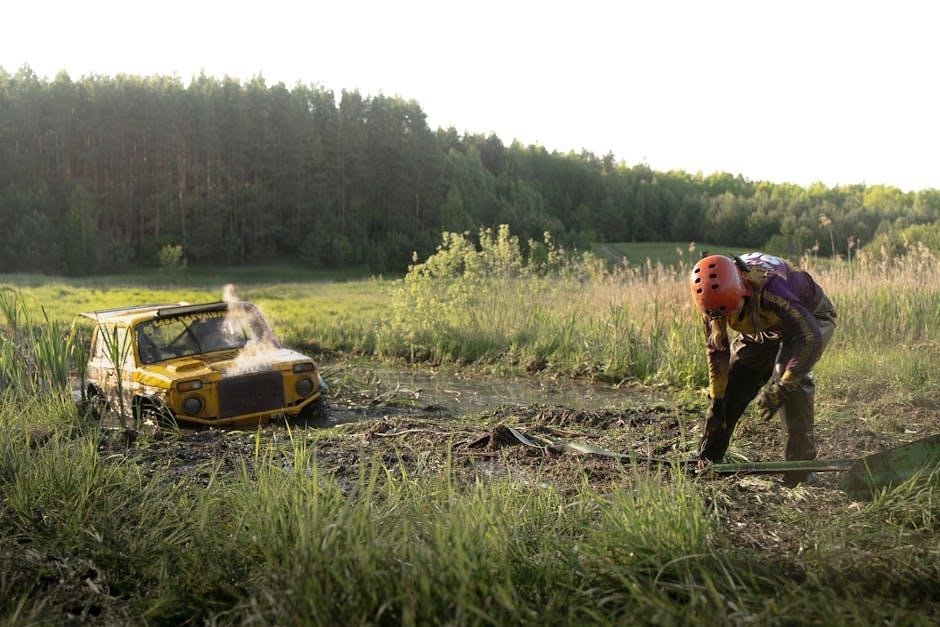recovery trivia questions and answers pdf
Recovery trivia questions and answers pdf offers an engaging way to educate individuals about recovery processes, coping mechanisms, and mental health. It fosters community support and empowerment through knowledge-sharing, making the journey toward healing interactive and accessible for all participants.
Importance of Recovery Trivia Questions and Answers in Education and Engagement
Recovery trivia questions and answers play a vital role in education and engagement by making learning interactive and accessible. They encourage active participation, foster meaningful discussions, and help individuals gain a deeper understanding of recovery concepts. By incorporating open-ended questions, these tools promote critical thinking and reflection. Trivia also serves as a platform to reduce stigma around mental health and addiction, offering practical insights and fostering a sense of community. This approach ensures that knowledge is not only acquired but also applied, empowering individuals in their recovery journeys.

Types of Recovery Trivia Questions
Recovery trivia questions are categorized into substance abuse, mental health, coping skills, and relapse prevention. They cover various aspects, from commitment to recovery to triggers and strategies for maintaining sobriety.
Substance Abuse and Mental Health Recovery Questions
These questions focus on understanding addiction, mental health recovery, and coping strategies. They explore triggers, relapse prevention, and the role of denial in hindering recovery. Open-ended inquiries encourage participants to reflect on their beliefs and experiences, fostering deeper insight. Topics include substance abuse treatment groups, personal growth, and the impact of trauma on addiction. Such questions promote engagement and education, helping individuals and groups navigate the recovery process effectively.
Coping Skills and Relapse Prevention Trivia
These questions focus on identifying triggers, developing healthy coping mechanisms, and understanding relapse prevention strategies. They encourage participants to reflect on personal behaviors and attitudes that may interfere with recovery. Topics include recognizing entitlement to substance use, limiting exposure to harmful influences, and testing oneself in recovery. Such trivia fosters self-awareness and equips individuals with practical tools to maintain long-term sobriety and mental well-being.
Who Can Benefit from Recovery Trivia?
Individuals in recovery, counselors, educators, and advocates benefit from recovery trivia. It enhances engagement, education, and support, making the healing journey collaborative and empowering through shared knowledge.
Individuals in Recovery
Recovery trivia empowers individuals in recovery by reinforcing knowledge, fostering reflection, and encouraging personal growth.Interactive questions help assess progress, identify triggers, and apply coping strategies.Engaging with these resources promotes self-awareness, accountability, and resilience, making the recovery journey more manageable and meaningful. It also provides a platform for sharing experiences, reducing stigma, and building a stronger foundation for long-term sobriety and mental well-being.

Counselors and Group Leaders
Recovery trivia provides counselors and group leaders with a dynamic tool to engage participants, spark meaningful discussions, and assess understanding of recovery concepts. These resources enable facilitators to create structured sessions, promote active learning, and foster a supportive environment. Trivia questions can be tailored to specific group needs, encouraging teamwork and reflection while reinforcing key principles of recovery and personal growth.
Educators and Advocates
Recovery trivia questions and answers pdf serves as a valuable resource for educators and advocates, offering a structured way to educate individuals about recovery. These materials provide accessible, engaging content for schools, workshops, and community events. By incorporating trivia, educators can promote awareness, reduce stigma, and foster understanding of mental health and substance abuse recovery. Advocates can use these tools to inspire discussions and empower individuals with knowledge.

How to Structure a Recovery Trivia Quiz
Structure your quiz by balancing easy and challenging questions, ensuring engagement for all participants. Include reflection and discussion prompts to deepen understanding and foster meaningful conversations.
Creating a Balanced Mix of Easy and Challenging Questions
A well-structured recovery trivia quiz should blend easy and challenging questions to cater to diverse knowledge levels. Start with basic questions to engage participants, then gradually introduce more complex ones to stimulate deeper thinking. This mix ensures active participation, keeps the atmosphere dynamic, and fosters a sense of accomplishment as individuals grow in understanding. It also encourages teamwork and collaboration among group members.
Incorporating Reflection and Discussion
Incorporating reflection and discussion into recovery trivia enhances its educational value. After answering questions, participants can reflect on their responses, fostering deeper understanding and personal insight. Group discussions encourage open dialogue, allowing individuals to share experiences and learn from one another. This collaborative approach strengthens connections and promotes a supportive environment, making the trivia experience both engaging and meaningful for everyone involved in the recovery journey.
Examples of Recovery Trivia Questions
Examples include questions about commitment to recovery, triggers, and relapse prevention strategies, designed to spark engagement and deeper understanding of the recovery process.
Commitment to Recovery
Recovery trivia questions explore essential aspects of commitment, such as recognizing the need for change, setting personal recovery goals, and understanding that recovery is a lifelong journey. These questions help individuals reflect on their dedication to sobriety and personal growth, fostering a deeper understanding of the challenges and triumphs involved in the recovery process. They also emphasize the importance of perseverance and self-awareness in maintaining long-term commitment.
Triggers and Coping Mechanisms
Recovery trivia questions and answers pdf often focus on identifying triggers and exploring healthy coping strategies. These questions help individuals understand common triggers, such as stress or emotional challenges, and how to manage them effectively. By engaging with these topics, participants gain insight into practical techniques for avoiding relapse and maintaining mental well-being. Reflection and discussion are key components, fostering deeper understanding and personal growth in recovery journeys.
Relapse Prevention Strategies
Recovery trivia questions and answers pdf often highlight relapse prevention strategies, emphasizing techniques like mindfulness, support systems, and accountability. These questions educate participants on identifying early warning signs and developing practical tools to maintain sobriety. By exploring real-life scenarios and evidence-based methods, individuals gain confidence in navigating challenges. Reflection and discussion foster a deeper understanding of personal triggers and coping mechanisms, enhancing long-term recovery success.
The Role of Community in Recovery Trivia
Community plays a vital role in recovery trivia by fostering group engagement and shared learning. It encourages teamwork, support, and open discussions, strengthening the recovery journey.
Group Engagement and Teamwork
Group engagement and teamwork are central to recovery trivia, fostering collaboration and mutual support. Participants work together to answer questions, sharing insights and experiences. This collective approach not only enhances learning but also strengthens bonds, creating a supportive environment where individuals can grow together, promoting connection and understanding in the recovery process.
Optional Reflections for Deeper Insight
Optional reflections after answering trivia questions encourage participants to delve deeper into their personal experiences and emotions. This allows for meaningful discussions, fostering self-awareness and personal growth. Reflections can be individual or group-based, helping individuals connect their own recovery journeys with the knowledge gained, while promoting emotional healing and a stronger understanding of their progress in a supportive environment.

Resources for Creating Recovery Trivia
Utilize PDF guides like “The Big Book of Questions & Answers” and “The Mammoth General Knowledge Quiz Book” for diverse recovery trivia content. These resources provide structured templates and inspiration for crafting engaging questions tailored to mental health and addiction recovery topics, ensuring a comprehensive and educational experience for participants.
Recommended PDF Guides and Workbooks
PDF guides like “The Big Book of Questions & Answers” and “Substance Abuse Recovery Trivia” offer structured templates for creating engaging recovery trivia; Workbooks tailored for mental health and addiction recovery provide inspiration and ready-to-use questions, making it easier to design educational and interactive content. These resources are ideal for group therapy, support systems, and personal growth, ensuring a comprehensive and accessible approach to recovery education.
Online Tools and Flashcards
Online tools like Quizlet and Kahoot offer interactive flashcards and quizzes tailored for recovery trivia. These platforms provide digital flashcards with terms such as “relapse prevention” and “coping mechanisms,” making learning engaging and accessible. Multiplayer modes foster community involvement, while tracking features help monitor progress. These resources are ideal for individuals and groups seeking to enhance their recovery knowledge through fun, competitive, and structured learning experiences.
Handling Difficult Questions
Addressing sensitive topics requires empathy and care. Open-ended questions encourage honest dialogue, while respecting boundaries ensures participants feel safe sharing their experiences and insights.
Addressing Sensitive Topics
Addressing sensitive topics in recovery trivia requires empathy and care. Open-ended questions encourage honest dialogue while respecting participants’ boundaries. Optional reflections allow deeper exploration of personal struggles, fostering a safe space for sharing. This approach helps participants feel comfortable discussing triggers, mental health, or past experiences, promoting understanding and connection. Trivia questions on these topics are designed to educate and support, ensuring a respectful and non-judgmental environment for all involved.
Encouraging Honest Discussions
Recovery trivia fosters honest discussions by creating a safe, non-judgmental space. Open-ended questions encourage participants to share their thoughts and experiences freely. Active listening and clear communication are key to building trust. This approach helps individuals feel comfortable discussing challenges, beliefs, and personal growth. Honest dialogue strengthens connections and promotes a deeper understanding of recovery processes, making the experience meaningful and impactful for everyone involved.

Impact of Recovery Trivia on Mental Health
Recovery trivia reduces stigma by fostering understanding and empathy. It builds a supportive community, enhancing mental well-being through shared knowledge and encouraging open conversations about recovery journeys.
Reducing Stigma Through Knowledge
Recovery trivia questions and answers pdf educates individuals about mental health and addiction, dispelling myths and stereotypes. By sharing accurate information, it fosters empathy and understanding, reducing stigma. This engages participants in open conversations, encouraging a culture of acceptance and support. Knowledge empowers individuals to view recovery as a journey of strength, not shame, promoting a more compassionate and informed community.
Building a Supportive Community
Recovery trivia fosters a sense of community by engaging individuals in shared learning and mutual support. Participants collaborate, share insights, and encourage one another, creating a positive environment. This collective experience strengthens bonds, reducing feelings of isolation. By working together, individuals build a network of understanding and connection, turning recovery into a shared journey of growth and empowerment.


